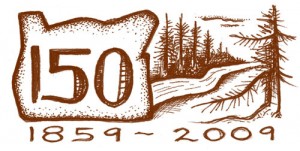They came at the plodding pace of the oxen pulling their wagons thousands of miles over dusty prairies and forested mountain passes. Others made their way in creaking schooners on voyages down the Atlantic coast of two continents, around the treacherous tip of South America and up the lengthy Pacific coast before sailing into the Columbia River to their goal.
These intrepid pioneers came to create a new life in the promised land of the Willamette Valley in Oregon Territory. The American settlers of the 1840s were met by those who already lived here – the native Indians and French fur trappers. The new residents’ journey was arduous, but there was no rest when they reached their destination.
They were farmers, loggers, shopkeepers, bankers and blacksmiths, missionaries and rogues, too.
They brought their wives and children – there was no going back. These were not fortune seekers who planned to make it rich and return to their home states. They came to the Willamette Valley to stay.
By 1859 these settlers had taken measures for Oregon to become one of the United States. In 2009 we commemorate the struggles of those early citizens who made their livelihoods doing the hard labor it takes to raise food, fall timber, save souls and set up a political system.
The Silverton, Mt. Angel and Molalla area is steeped in the culture of the people who established themselves here during the past 150 years. This year Our Town celebrates the region’s heritage with a series of stories about those who made it what it is.
Mt. Angel gets its German Catholic traditions from monks and nuns who came to bring Christianity to the region by establishing an abbey and monastery, and from the Swiss and German farmers who raised crops and cows on the rich soil.
Silverton began with Lutheran Scandinavian timber fallers and log mill workers laboring in the forested hills.
More settlers followed, building their homes where they felt a kinsmanship with those who had come before. Religion was often a part of this choice – Catholic in Mt. Angel, Protestant in Silverton.
As the population increased, towns developed where merchants bought and sold supplies, bankers and lawyers met needs of the community, teachers guided new generations and housewives provided the families’ support system.
Descendents of these first citizens still live in the area today. As part of our year-long series, Our Town will talk to them about their forefathers’ part in developing our communities. If you have an idea for a sesquicentennial story, drop up a note at [email protected].
Our lives are flavored by the legacy left by those who came before us. In this sesquicentennial year, we will take a look at the traditions that made us who we are today.
